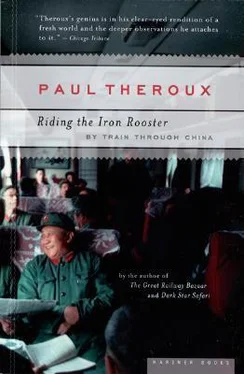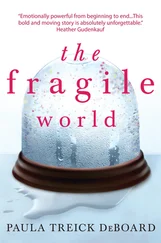The pilgrims hunker and prostrate themselves all over Lhasa, and they shuffle clockwise around every shrine. They flatten themselves on stair landings, outside the Jokhang and all around the Potala. They do it on the road, the riverbank, the hillsides. Being Tibetan Buddhists they are good-humored, and because they are from all over Tibet, Lhasa is their meeting place — they enrich the life of the town and fill its markets. They come out of a devotion to the Dalai Lama, the incarnation of the Bodhisattva Avalokitesvara. They pray, they throw themselves to the ground and they strew tiny one miao notes and barley grains at the shrines, and dump blobs of yak butter into the lamps. The very pious ones blow horns made from human thigh bones — a femur like an oboe — or carry water in bowls made from the lopped-off top of a human skull. They venerate the various thrones and couches of the Dalai Lama in the Potala, and even his narrow art-deco bed, his bathtub and toilet, his tape recorder (a gift from Nehru) and his radio. The Dalai Lama is worshipped as the Living God, but the pilgrims also pay homage to the images of Zong Kapa — founder of the Yellow Sect — and of the Lord Buddha, and of other Dalai Lamas, notably the 5th, whose great buildings dignify Lhasa. Pilgrims have made Lhasa a town of visitors who are not exactly strangers, and so even a real foreigner feels a sense of belonging there. Its chaos and dirt and its jangling bells make it seem hospitable.
Lhasa was the one place in China I eagerly entered, and enjoyed being in, and was reluctant to leave. I liked its smallness, its friendliness, the absence of traffic, the flat streets — and every street had a vista of tremendous Tibetan mountains. I liked the clear air and sunshine, the markets, the brisk trade in scarce antiques. It fascinated me to see a place for which the Chinese had no solution. They admitted that they had made grave mistakes in Tibet; but they also admitted that they did not know what to do next. They had not counted on the tenacious faith of the Tibetans, and perhaps they found it hard to believe that such dark, grinning people, who never washed, could be so passionate. Tibet has made no economic gains at all. It is entirely dependent on Chinese financial aid. The visiting Party officials stroll around looking smug and hard-to-please. They are mostly on junkets. Tibet is a junketer's paradise: a subject people, two fairly good hotels, plenty of ceremonial functions, and so far from Peking that anything goes. The Chinese reward each other with junkets and official trips — they often take the place of bonuses — and Tibet is the ultimate junket. But it is really for sight-seeing, not business. These Chinese officials nearly always look physically uncomfortable in Lhasa — it is the altitude, the strange food, and the climate, but it is also the boisterous Tibetans, who seem to the Chinese a bit savage and unpredictable — superstitious primitives if not outright subhuman.
The other aspect of Lhasa — and Tibet, too — is that like Yunnan it has become the refuge of hippies. They are not the dropouts I met years ago in Afghanistan and India, but mostly middle-class, well-heeled hippies whose parents gave them the airfaire to China. Some of them come by bus from Nepal. They seemed harmless to me and they were a great deal more desirable than the rich tourists for whom Lhasa was building expensive hotels and importing ridiculous delicacies — and providing brand-new Japanese buses so that groups of tourists could set out at dawn and photograph such rituals as The Sky Burial (Tibetans deal with their dead by placing them outside for vultures to eat). As Lynn Pan remarks in her analysis of recent Chinese history, The New Chinese Revolution, "it is difficult to avoid the conclusion that Tibetan culture, which has survived the worst that Maoism and force could do to stamp it out, has been left to be killed by tourism." But I had my doubts. Tibet seemed too vast and inaccessible and strange for anyone to possess it. It looked wonderful to me, like the last place on earth; like a polar ice cap, but emptier.
It took me a while to recover from the drive. My head still hurt from the crash. My neck had been wrenched. I still had an interesting wound under my left eye. The altitude gave me insomnia. I lay in bed in the cold hotel room, with my heart pounding, my pulse racing. Outside, I would sometimes forget where I was and begin running and have to gasp for breath.
I found a young Tibetan fellow who had an encyclopedic knowledge of the monasteries. He did not speak Chinese at all. He had left Tibet as a child with his parents — when the Dalai Lama escaped in the exodus of 1959, with his 70,000 followers. After his education in Kashmir, in Ladakh, and in various Tibetan refugee schools in Simla (he had been in India for twenty-five years), he returned home. I asked him what it was like being back in Chinese Tibet.
"It is all right. But my heart is not here. My heart is in Dharmsala — you know what I mean?"
"The Dalai Lama is in Dharmsala."
"That is correct. He is not here."
His name was Ralpa. It was very funny to see him addressed in Chinese. He smiled at the Chinese speaker and said, "No, no, no, no." He could not even utter that useful Chinese sentence that means, "I hear you but I don't understand you." Since the Chinese did not speak Tibetan, and rarely spoke English, Ralpa in a year of being back in Tibet had never had a conversation with a Chinese. I asked him whether it bothered him. He said no. He said, "This isn't China."
We went to the Drepung Monastery. Before Mao's Religious Re-form of 1955, Drepung had 12,000 monks. It was said to be the largest monastery in the world. It was a sprawling place of whitewashed buildings piled up high in a ravine on a hillside just outside Lhasa. It's nickname was "The Rice Mound." Its population was much reduced. It now had 500 monks, but they had returned to monastic life only recently. One I spoke to had spent the twenty years between 1959 and 1979 on a farm in eastern Tibet, digging vegetables. He was wearing thick brown robes.
"Did you wear these robes on the farm?"
"No. I had farm clothes. A blue suit. I hated it."
"Did you do any praying?"
"No. It was forbidden."
"How did you get back here to Drepung?"
"I heard that things were improving politically, so I made a request. I asked whether I could return to my monastery, and they said yes."
Another monk at Drepung was a muscular, broad-shouldered man with a deep laugh.
"I was in prison for twenty-one years," he said.
"What was your crime?"
"No crime!" His laugh attracted attention, and pilgrims stared at him, but he didn't lower his voice. "I protected the Dalai Lama at the Norbulingka when he escaped. I was fighting, you see, so that he could get away." He looked very pleased as he said this. "The Chinese caught me and put me in prison."
"Where was the prison?"
"Not one, but many prisons. They kept moving me from place to place."
"What do you think of the Chinese?"
"I don't hate them. I just want them to leave," he said. "But most of all I want the Dalai Lama to come back. Then I can die happy. I will be very unhappy until then, and I don't want to die until the Dalai Lama returns."
"Do you think he will?"
He said nothing, but his gesture was eloquent. He pressed his big hands together and shut his eyes and made a prayerful sign.
I gave him and other monks pictures of the Dalai Lama. Some monks approached me and asked in halting English, "Dalai Lama picture?" I was not the first traveler to pass through handing out portraits.
Ralpa pointed to a cluster of white buildings on the hillside.
"That is the Nechung Monastery, where the Oracle lives. But he is with the Dalai Lama now, in India."
"What does the Oracle do?"
Читать дальше












